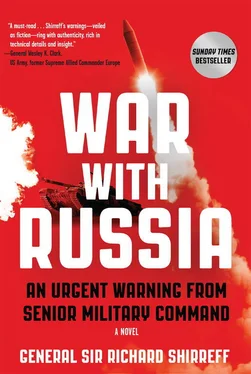For a moment he paused, keenly aware that he would be sending hundreds of unsuspecting British sailors to a watery grave. A student of history himself, he understood full well that this attack was on the personal order of the President, but against a country that he was not even sure was yet at war with Russia. The British mine countermeasures ship sunk in Riga was different. It had been collateral damage and should not have been there in the first place. This was a deliberate and, some might say, unprovoked attack. Chernavin’s indecision was only momentary, though. He looked at his Executive Officer and knew that, if he had wanted to hold off, then he should not have ordered him to confirm it was the British carrier. If he ducked this decision now, the President’s wrath would be implacable. He had little doubt he would end up against a wall and his extended family would never see the outside of the Gulag again.
“Bearing three–three–five. Range, nine thousand meters,” chanted the sonar operator, like a Russian Orthodox priest standing by the iconostasis in an incense-filled church.
“Identity confirmed. Stand by to fire,” Chernavin said to his Fire Controller.
Krasnokamensk continued to slide silently under the waves.
“Shoot.”
There was a perceptible thump throughout the submarine as the first torpedo left its tube; a pause, then another, and then a third.
“Torpedoes away… Ten degrees down on the planes! Hard a starboard!” ordered Chernavin. “Take her down to one hundred meters,” he told the planesmen.
The submarine tilted steeply as it dived deep and right to avoid detection. Then, as it stabilized, there was silence again in the control room as they waited for the inevitable.
The sonar operators heard the rapid, rhythmical thud of Queen Elizabeth ’s giant propellers change note as the torpedoes were spotted and she desperately began to take evasive action.
Too little and too late , Chernavin thought, as the sophisticated torpedoes latched on to their vast, slow turning target. It might evade one, but it stood no chance against three. Chernavin prayed silently. Let there be no malfunctions . The consequences of failure were more terrifying than the guilt that would come with success.
Then, audible to every crewmember of the submarine, was a muffled explosion. The first torpedo had struck home. Another pause, then another two explosions.
The sonar operator now chanted the litany of death: “Explosion… Second explosion… Third explosion.”
In the earphones of the sonar operators, the thud of Queen Elizabeth ’s propellers stopped, to be replaced by the screams of collapsing bulkheads.
2230 hours, Friday, June 2, 2017
Prime Minister’s Office, House of Commons, London
TREV WALKER KNOCKED on the door of the functional, if cramped, office used by the Prime Minister in the Palace of Westminster and walked in. As he did so, that much-quoted line of Harold Wilson, a former Labour prime minister, came to mind: “A week is a long time in politics.”
A lot had happened that past week. First had come the dreadful news of the sinking of HMS Queen Elizabeth , pride of the Royal Navy. The news had stunned the country, to be followed by an outpouring of anguish and fury, directed first at the Russians who had perpetrated this atrocity. Then, increasingly, at the politicians and top military brass who had allowed this to happen. Nearly 900 men and women, sailors and marine and army commandos—the commandos laden down with bergen rucksacks, body armor and weapons, as they were preparing to disembark—had died in minutes, when the ship went down.
It was a figure beyond the comprehension of a nation that knew only the flag-draped coffins of the comparatively few servicemen and women who had been repatriated from the wars in Afghanistan and Iraq. This was a casualty count not experienced since the Second World War. And for the first time ever, large numbers of young women sailors were included in the list of mass casualties. Nor were there many bodies to mourn. Most were entombed inside the carrier, deep beneath the Baltic Sea.
The Ministry of Defense Press Office had done its best to focus on the many acts of heroism; such as the ship’s captain, Commodore Tony Narborough, who had gone down with his ship, and the Executive Officer, Commander James Bush, last seen desperately trying to rescue a young female sailor whose legs had been blown off when the first torpedo exploded under the ship’s magazine. But nothing could stem the growing tide of anger felt by a traumatized nation, which gradually mutated into a stubborn determination to fight back and not to take this outrage lying down.
Of course, Walker reflected, it was inevitable that Prime Minister William Spencer, himself in an advanced state of shock, should be subjected to a sustained attack from the media at the state Britain’s armed forces had been allowed to fall into under his leadership. It had not helped that the newspapers, with deliberate cruelty and despite Walker’s efforts, kept referring to it happening “on his watch.”
Armchair admirals pilloried his recklessness in dispatching ships into a war zone without adequate protection, especially when it became known that a couple more days would have seen a suitable NATO force arrive in theater. The same newspapers that first encouraged and then praised his leadership in sending the Queen Elizabeth were the ones that most viciously condemned him.
Prime Minister Spencer, ever the consummate politician, had instinctively tried to hang on to power. First to be sacrificed had been Mainwaring, the Chief of Defense Staff and, as head of Britain’s demoralized Armed Forces, an obvious and immediate bone to throw to his critics. He had been ignominiously sacked, without the consolation of a peerage, much to his humiliation and the fury of his wife.
However, the Prime Minister’s attempt to put the blame on Mainwaring had not been enough to call off the baying hounds of the media and his increasingly outraged and vocal party, which had conveniently forgotten that they had been happy enough to sanction the various defense cuts when it had been their seats at risk in previous elections.
Walker had quickly seen the way the wind was blowing and tried to tell Spencer that resignation was the only honorable way out. But to no avail. Instead, recalling Churchill’s victory in a confidence debate in the House of Commons in 1942, after the disasters of the fall of Singapore and Tobruk, Spencer had called for a confidence debate, too. Despite an impassioned plea for national unity at this moment of historic crisis, it had, predictably, been a disaster, with one hitherto loyal backbencher after another lining up to condemn the Prime Minister’s leadership and call for his resignation.
Back in “The Den” in Number 10 Downing Street, after the overwhelming vote of no confidence, Walker had rehearsed the traumatized Spencer in the resignation speech he had quickly scribbled for him, before leading the now wet-eyed Prime Minister to face the array of media microphones and TV cameras outside the front door of Number 10. Here, in full view of the world, first pink-faced and finally blubbering like a chastened schoolboy discovered doing something unspeakable, Spencer’s glittering political career had ended in tongue-tied humiliation.
Walker, however, was not one to look back, for this was also an opportunity to further his own interests. He had always maintained close links with the Chancellor of the Exchequer, Oliver Little; tough, ruthless, sardonic, but also a masterly political operator, who had been extending his tentacles of influence across Whitehall to take advantage of the day when the Prime Minister eventually stepped down. That day had now come earlier than anticipated. Nevertheless, Walker was quick to see the opportunity to consolidate his own influence by supporting Little’s leadership aspirations.
Читать дальше












